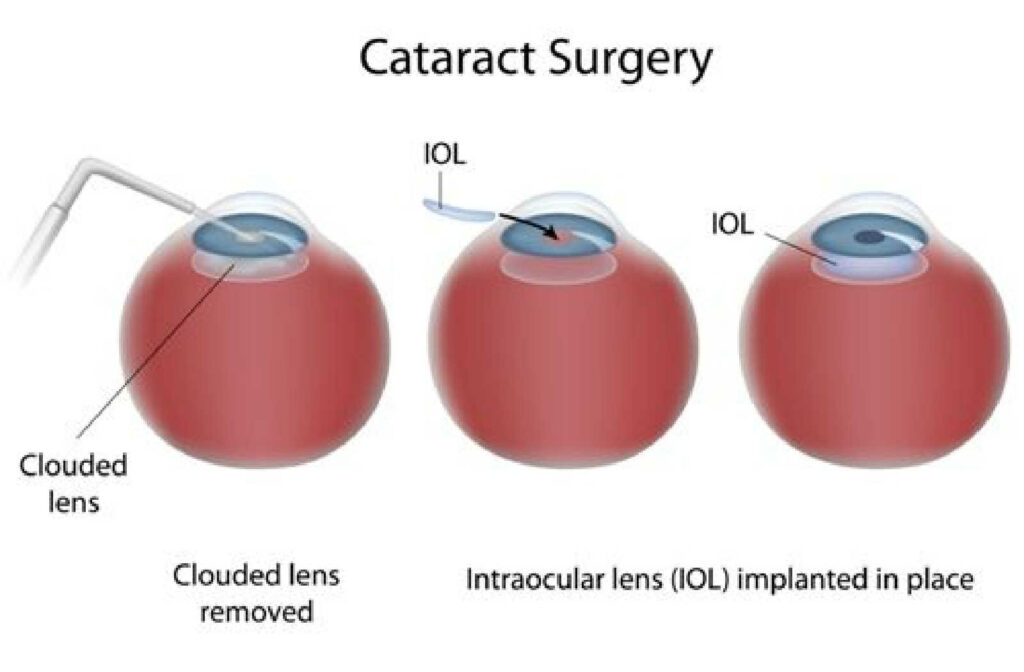Post Cataract Surgery Vision Expectations
Cataract surgery isn’t a magic bullet that fixes all your vision problems. While it’s an effective way to get rid of cataracts, many people find they still need glasses afterward—at least for some activities. With that in mind, some options can minimize or even eliminate one’s need for prescription glasses or contact lenses following the surgery.
This article explores an overview of cataracts and surgery to remove them. It also goes over some of your options for the intraocular lenses (IOLs) that replace your old, clouded lens and how they correct different vision issues.
What is Cataract Surgery?
Cataracts typically don’t give you any problems during their early development. However, there usually comes the point where your vision becomes blurry or dim enough to affect your ability to complete many daily activities. At this point, cataract surgery is often a great option.
Before Surgery
Your eye doctor won’t book you for the procedure until they have done a couple of things. First, you will have an opportunity to ask any questions, and your doctor can go over the risks and benefits of the surgery.
Then they will perform an ultrasound on your eye. This allows the eye care doctor to take measurements to determine which type of IOL will be the best fit for your eye. Once they know what you’re a candidate for, they’ll discuss your options.
In addition, you may sometimes receive an antibiotic eye drop for a few days before the procedure to prevent infection.
During Surgery
The eye doctor will numb your eye to prevent you from feeling any discomfort during the procedure. Then a small incision is made to the side of the cornea. The old lens is removed and replaced with an artificial one.
The whole surgery is usually an outpatient procedure and is relatively quick. Typically it takes around 2 hours to complete from start to finish.
After Surgery
There may be some mild discomfort in the days following your procedure, but you should start to notice improvements fairly quickly. Usually, the eye doctor will book you in for several follow-up appointments after the surgery to ensure everything is healing as it should.
Most people fully recover without any complications within 4 to 6 weeks. But this can vary from person to person.
What Percentage of People Need Glasses After Cataract Surgery?
According to studies, approximately 30-50% of people still require glasses for certain activities, such as reading or driving, after cataract surgery. This percentage can vary depending on factors like the type of IOL chosen and pre-existing conditions like astigmatism.
For example, a report published in the American Journal of Ophthalmology highlighted that premium or multifocal IOLs significantly reduce the chances of needing glasses compared to standard IOLs.
Who Needs Glasses After Cataract Surgery?
Individuals with pre-existing vision conditions like astigmatism or those who opt for standard IOLs often need glasses. Basic IOLs focus on cataract removal without addressing other vision needs, making additional corrections necessary for clear, everyday vision.
Why Do Some People Need Glasses After Cataract Surgery?
The IOL that replaces your old lens is one of the most significant factors in whether you’ll still need glasses after cataract surgery. Because normal IOLs don’t correct in multiple ways, many patients still require some external correction, which can affect the cataracts treatment outcome.
Other factors include other eye conditions such as astigmatism or the general prescription you require for good vision.
Center For Sight offers 3 vision options tiers for you to choose from depending on what your desired result is:
- Basic Vision: This service simply removes the cataract without offering any vision improvement regarding your near or farsightedness.
- Custom Vision: If you go with the custom tier, you’ll have the cataract removed and one focal point corrected. For example, your IOL will correct your near or far vision.
- Advanced Vision: With the advanced vision tier, you’ll receive an IOL that provides multifocal correction and potentially eliminate your need for glasses after the surgery.
What Kind of Glasses Are Needed After Cataract Surgery?
After your cataract surgery, you may require reading glasses for near vision or prescription lenses for astigmatism or distance issues. The type depends on your remaining vision needs and whether you opted for basic or more advanced IOLs during surgery.

Preventing the Need for Glasses With IOLs
Unless otherwise discussed with your eye care doctor, the chances are fairly high that you will need glasses at least part of the time following your surgery if you did before. A standard procedure usually only includes the removal of the cataract and a custom-shaped IOL.
However, at Center For Sight, one of our premium IOL options is called TECNIS Synergy™ IOLs. In addition to correcting vision issues, they will also correct astigmatism simultaneously. In the States, our practice was the first to implant these IOLs. In addition to correcting vision issues, they will also correct astigmatism simultaneously. Center For Sight is proud to have been the first in the U.S. to implant these IOLs, showcasing our commitment to innovation.
The reason that a premium IOL like these is so beneficial is that they are multifocal. So, instead of the IOL simply fixing one focal point, it corrects a range for overall improved vision. Multifocal IOLs perform better by correcting multiple ranges of vision, from near to far, instead of focusing on just one area.
For example, if a regular IOL is implanted that fixes your close-up focal point, you may still need glasses or contact lenses to correct further distances.
By contrast, if a premium, multifocal IOL is implanted, you have a much better chance of not depending on glasses following the surgery.
Find Out More About Cataract Surgery and IOLs
Premium IOL options like TECNIS Synergy™ IOLs give you the best chance at not requiring glasses after cataract surgery.
If you want to know more about getting rid of problematic cataracts and your prescription glasses, give us a shout today. Our helpful staff at Center For Sight are happy to answer all your questions and book you an appointment at a clinic near you.
FAQs About Wearing Glasses After Cataract Surgery
Q1. Will I need glasses after cataract surgery?
Yes. Many patients still require glasses for activities like reading or driving after cataract surgery. Your need for glasses depends largely on the type of IOL implanted and your pre-existing vision conditions.
Q2. Do you still need to wear glasses after cataract surgery?
Yes. While cataract surgery improves vision clarity, standard IOLs typically don’t address all vision issues. Patients with astigmatism or other vision problems often need glasses to see clearly.
Q3. Can you wear glasses after cataract surgery?
Yes. Glasses can complement the results of cataract surgery, especially if you opted for a standard IOL. They may help with near vision, distance vision, or correcting astigmatism.







